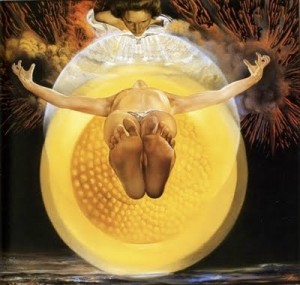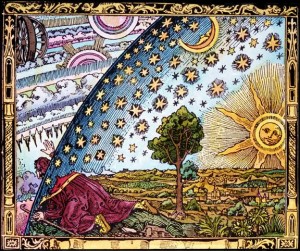From Psalms:
In you, O Lord, have I taken refuge;
let me never be ashamed.
In your righteousness, deliver me and set me free;
incline your ear to me and save me.
Be my strong rock, a castle to keep me safe;
you are my crag and my stronghold.
(From the Daily Office Lectionary – Psalm 71:1-3 (BCP Version) – September 20, 2012)
 This is one of my favorite images from Scripture, God as strong rock, castle, crag, and stronghold. In fact, during my sabbatical last year this verse kept coming to mind as I explored the ruins of castles and monastic foundations in Scotland, England, and Ireland. My fondness for this metaphor today dovetails with my thoughts the past couple of days about the nature of sovereignty (see yesterday’s meditation on praying Psalm 72 in modern America) and God’s reign (the day before, considering the modern political implications of Christ’s triumphal entry in John 9).
This is one of my favorite images from Scripture, God as strong rock, castle, crag, and stronghold. In fact, during my sabbatical last year this verse kept coming to mind as I explored the ruins of castles and monastic foundations in Scotland, England, and Ireland. My fondness for this metaphor today dovetails with my thoughts the past couple of days about the nature of sovereignty (see yesterday’s meditation on praying Psalm 72 in modern America) and God’s reign (the day before, considering the modern political implications of Christ’s triumphal entry in John 9).
Like any metaphor and every metaphor, God as rocky fortress is limited. All metaphors, similes, and analogies breakdown at some point. Nonetheless, this is where the metaphor in today’s Psalm takes me . . . .
Life in a stone castle was anything but relaxed and luxurious. Even the “lairds and ladies of the manor” would have had their work to do, although it wouldn’t have been as onerous as that of, say, the scullery maids, the chamberlains, or the stable boys. Monastic foundations weren’t much different: a division of labor shared by everyone from the newest novice or lay brother to the abbot or prior. The same would have held true in a Celtic or early medieval convent. Everyone would have had some share in keeping the community within the stone walls running smoothly to everyone’s good. In a very real sense, the castle, monastery, or convent would have been a “commonwealth”.
Although mostly used today in the context of international trade (as in “the commonwealth of nations”) or as a synonym for nation, state, or territory (as in “the Commonwealth of Massachusetts” or “the Commonwealth of Puerto Rico”), the word dates from the 15th Century with a different significance. Meaning “common well-being,” it connoted a community of interest promoting the public welfare or general good of every member.
In the 17th Century the philosopher Thomas Hobbes wrote his book Leviathan on the origin, nature, and forms of a commonwealth, explaining that the function of a commonwealth is to protect human liberty and provide security for the people living in it. Hobbes argued that the citizens or subjects of a commonwealth have the right to food, clothing, and shelter, the right to protection from harm or injury, the right to engage in lawful commerce, the right to an education, the right to health and safety, and the right to legal protection of one’s possessions; these rights are matched by the commonwealth’s mutual responsibility to protect them. Interestingly, Hobbes’s treatise suggests the notion that the kingdom or reign of God is an eternally perfect and spiritual commonwealth.
Which brings me back to the metaphor in the Psalm. God conceived of by the Psalmist as a castle, crag, or rocky fortress is not simply an image of God’s protection of individual safety; it is a metaphor of the community which in God lives and moves and has its being (Acts 17:28). The Psalmist’s strong rock, castle, crag, and stronghold is Jesus’ kingdom of God (or kingdom of heaven). It is the commonwealth of God, “the kingdom of our Lord and of his Messiah, and he will reign forever and ever.” (Rev. 11:15) It is the community of eternal life in which we, believing participants, have mutual accountability for our rights and responsibilities.
When we pray this Psalm and claim God as our stronghold, we also claim our rights and take up our responsibilities as “citizens with the saints and also members of the household of God.” (Eph. 2:19)
====================
Father Funston is the rector of St. Paul’s Episcopal Church, Medina, Ohio.
 “Average Sunday Attendance” – also known as “ASA” – has become a hot topic in church circles. It’s how we gauge the health of congregations, not that it’s a very good measure of that, but what other easily accessed metric to governing boards and denominational judicatories have? If the parish priest, pastor, senior minister, whatever he/she may be called is doing a good job, the assumption is, the pews are going to be full. So if we count the number of seats in the seats, voila! we know if things are good.
“Average Sunday Attendance” – also known as “ASA” – has become a hot topic in church circles. It’s how we gauge the health of congregations, not that it’s a very good measure of that, but what other easily accessed metric to governing boards and denominational judicatories have? If the parish priest, pastor, senior minister, whatever he/she may be called is doing a good job, the assumption is, the pews are going to be full. So if we count the number of seats in the seats, voila! we know if things are good. As I look at life, crooked lines abound. It’s what human beings do. Bar-Jesus (as the magician Elymas is also named in the Book of Acts) may have been making the straight crooked with evil intent, but I suspect that most human beings just do it out of habit, out of an inability to do anything else, out of (maybe) some sort of primate instinct to make a mess. My mother used to admonish me, in a lot of circumstances, “Don’t get bent out of shape!” At sixty years of age, I have come to suspect that there is no way to avoid life getting bent out of shape! Crooked lines abound.
As I look at life, crooked lines abound. It’s what human beings do. Bar-Jesus (as the magician Elymas is also named in the Book of Acts) may have been making the straight crooked with evil intent, but I suspect that most human beings just do it out of habit, out of an inability to do anything else, out of (maybe) some sort of primate instinct to make a mess. My mother used to admonish me, in a lot of circumstances, “Don’t get bent out of shape!” At sixty years of age, I have come to suspect that there is no way to avoid life getting bent out of shape! Crooked lines abound. A couple of days ago I talked about Cornelius’s conversion from pagan to Christian through some time spent as a pious not-quite-proselyte Gentile. In today’s reading Peter defends his decision to baptize the Gentiles (Cornelius and his entire household) with this great question, “Who was I that I could hinder God?” It certainly shut down his critics!
A couple of days ago I talked about Cornelius’s conversion from pagan to Christian through some time spent as a pious not-quite-proselyte Gentile. In today’s reading Peter defends his decision to baptize the Gentiles (Cornelius and his entire household) with this great question, “Who was I that I could hinder God?” It certainly shut down his critics! Judaism is not a missionary religion. It is, however, a proselytic religion. This means that Jews don’t go looking for converts, but those who come to them interested in becoming Jews are instructed and initiated; these initiates are called proselytes. Cornelius might have become a proselyte, but we know that he was not because if he had been, Peter would have had no issues with seeing him, meeting him, eating with him. Peter did have those issues initially, but then was shown the vision of unclean animals which he was told to eat. Peter interpreted that vision to mean that he should not treat non-Jews as unclean; it was the beginning of the Jewish Christian church welcoming non-Jews (“Gentiles”) as members.
Judaism is not a missionary religion. It is, however, a proselytic religion. This means that Jews don’t go looking for converts, but those who come to them interested in becoming Jews are instructed and initiated; these initiates are called proselytes. Cornelius might have become a proselyte, but we know that he was not because if he had been, Peter would have had no issues with seeing him, meeting him, eating with him. Peter did have those issues initially, but then was shown the vision of unclean animals which he was told to eat. Peter interpreted that vision to mean that he should not treat non-Jews as unclean; it was the beginning of the Jewish Christian church welcoming non-Jews (“Gentiles”) as members. Saint Stephen, one of the first deacons of the church, has just preached a sermon in which he has reminded his hearers, Jewish authorities in Jerusalem, that the Jews had a history of mistreatment of prophets, Their ancestors, he has said, “killed those who foretold the coming of the Righteous One, and now [his listeners] have become his betrayers and murderers.” No wonder they were angry with him.
Saint Stephen, one of the first deacons of the church, has just preached a sermon in which he has reminded his hearers, Jewish authorities in Jerusalem, that the Jews had a history of mistreatment of prophets, Their ancestors, he has said, “killed those who foretold the coming of the Righteous One, and now [his listeners] have become his betrayers and murderers.” No wonder they were angry with him. This short passage from the Book of Acts describes the sort of world Jesus intended. Not just the sort of church . . . . the sort of world, the sort of human society, a complete community in which no one claims private ownership (it’s all God’s remember) and where there are no needy persons because what is needed is distributed equitably.
This short passage from the Book of Acts describes the sort of world Jesus intended. Not just the sort of church . . . . the sort of world, the sort of human society, a complete community in which no one claims private ownership (it’s all God’s remember) and where there are no needy persons because what is needed is distributed equitably. These are the words spoken by the great crowd of Jews and others who thronged the streets of Jerusalem for the Festival of Shavu’ot when the Twelve, empowered by the Holy Spirit, begin to tell the story of Jesus in languages they had never before spoken. Shavu’ot is a celebration with both agricultural and historical significance in Judaism. It is known as the “festival of the first fruits,” a harvest feast when the first fruits were brought as offerings to the Temple; it is also known as the “festival of the giving of the Law,” a celebration of the handing down of Torah on Mt. Sinai. It was called Pentecost, a Greek word meaning “fiftieth”, because it always falls on the fiftieth day after the Passover. That year it fell on the fiftieth day after the Resurrection and, thus, the Christian feast of the Holy Spirit carries that name, as well.
These are the words spoken by the great crowd of Jews and others who thronged the streets of Jerusalem for the Festival of Shavu’ot when the Twelve, empowered by the Holy Spirit, begin to tell the story of Jesus in languages they had never before spoken. Shavu’ot is a celebration with both agricultural and historical significance in Judaism. It is known as the “festival of the first fruits,” a harvest feast when the first fruits were brought as offerings to the Temple; it is also known as the “festival of the giving of the Law,” a celebration of the handing down of Torah on Mt. Sinai. It was called Pentecost, a Greek word meaning “fiftieth”, because it always falls on the fiftieth day after the Passover. That year it fell on the fiftieth day after the Resurrection and, thus, the Christian feast of the Holy Spirit carries that name, as well. Have you ever done that thing on a public street corner where a couple of people stand there looking up and pretty soon some passing pedestrian, wondering what they are gazing at, will stop and look up, and then another and then another and so on until a lot of people are looking up into the sky at nothing for no reason? I have an image of that in my mind when I read the this passage, although in this case the “men of Galilee” are not looking at nothing for no reason. They are looking at something they can no longer see, except in their minds’ eye, and it is certainly not “for no reason” that they are doing so. Something phenomenal has happened to them; someone they thought had been killed by the authorities had returned from the dead, had eaten with them, talked with them, appeared to them over the course of over seven weeks, and now he had “ascended into heaven.” They had plenty of reason to stand there staring into the sky into which he had apparently gone.
Have you ever done that thing on a public street corner where a couple of people stand there looking up and pretty soon some passing pedestrian, wondering what they are gazing at, will stop and look up, and then another and then another and so on until a lot of people are looking up into the sky at nothing for no reason? I have an image of that in my mind when I read the this passage, although in this case the “men of Galilee” are not looking at nothing for no reason. They are looking at something they can no longer see, except in their minds’ eye, and it is certainly not “for no reason” that they are doing so. Something phenomenal has happened to them; someone they thought had been killed by the authorities had returned from the dead, had eaten with them, talked with them, appeared to them over the course of over seven weeks, and now he had “ascended into heaven.” They had plenty of reason to stand there staring into the sky into which he had apparently gone. The readings for the Daily Office on a Sunday depart from the daily flow of the lessons for the rest of the week; they are also unrelated to the lessons in the Eucharistic lectionary (especially since our adoption of the Revised Common Lectionary). On Sundays in recent weeks, those who recite the Daily Office have been treated to excerpts, like this, from the Book of Acts. I’ve set out the whole of today’s lesson, instead of simply quoting a verse or three, because of the symmetry of the passage: we start with magic (Paul creating magical amulets of handkerchiefs and aprons) and we end with magic (magicians burning their valuable grimoires). I find this sort of biblical pericope troubling and difficult to handle. ~ Many Christians wear crosses and medallions, carry prayer cards, wear scapulars, and use “prayer napkins” blessed by bishops, priests, revivalists, and television evangelists. The tradition of the church teaches that these talismans derive their power, not from anything inherent in or given to the object, rather from the firm faith and Godly devotion of the believer. But the handkerchiefs and aprons described here by Luke, the author of Acts, seem more like fetishes, given healing powers through what can only be called contagious sympathetic magic; these objects touched Paul, now they heal – the belief or faith of the sick person healed has nothing to do with it. ~ At the end of the passage, we are told that many “who practiced magic” became believers and burned their books of spells. They seem to have done so not through any conversion, but because Paul’s magic was greater than their own. ~ I’ve read several commentaries and sermons exegeting this passage, and all attempt to differentiate Paul’s “sweat rags” (as one might also translate the original Greek) and working aprons from magical talismans, but all, in my opinion, fail. Luke’s story boils down to “our magic is better than their magic.” In the 21st Century, I find that singularly unhelpful! ~ But here’s what this story makes me think about: contagious sympathetic magic is supposed to pass magical power from one person or object to another that it touches; I don’t think that actually happens, but I know that faith can be contagious, passing from one powerfully faithful person to others whose lives and hearts he or she may touch. And that powerful faith can set hearts on fire rather than books (don’t get me started about burning books)! It is neither through magic handkerchiefs nor through burning grimoires that the word of the Lord spreads and grows mightily and prevails: it is through shared faith setting hearts on fire for Christ.
The readings for the Daily Office on a Sunday depart from the daily flow of the lessons for the rest of the week; they are also unrelated to the lessons in the Eucharistic lectionary (especially since our adoption of the Revised Common Lectionary). On Sundays in recent weeks, those who recite the Daily Office have been treated to excerpts, like this, from the Book of Acts. I’ve set out the whole of today’s lesson, instead of simply quoting a verse or three, because of the symmetry of the passage: we start with magic (Paul creating magical amulets of handkerchiefs and aprons) and we end with magic (magicians burning their valuable grimoires). I find this sort of biblical pericope troubling and difficult to handle. ~ Many Christians wear crosses and medallions, carry prayer cards, wear scapulars, and use “prayer napkins” blessed by bishops, priests, revivalists, and television evangelists. The tradition of the church teaches that these talismans derive their power, not from anything inherent in or given to the object, rather from the firm faith and Godly devotion of the believer. But the handkerchiefs and aprons described here by Luke, the author of Acts, seem more like fetishes, given healing powers through what can only be called contagious sympathetic magic; these objects touched Paul, now they heal – the belief or faith of the sick person healed has nothing to do with it. ~ At the end of the passage, we are told that many “who practiced magic” became believers and burned their books of spells. They seem to have done so not through any conversion, but because Paul’s magic was greater than their own. ~ I’ve read several commentaries and sermons exegeting this passage, and all attempt to differentiate Paul’s “sweat rags” (as one might also translate the original Greek) and working aprons from magical talismans, but all, in my opinion, fail. Luke’s story boils down to “our magic is better than their magic.” In the 21st Century, I find that singularly unhelpful! ~ But here’s what this story makes me think about: contagious sympathetic magic is supposed to pass magical power from one person or object to another that it touches; I don’t think that actually happens, but I know that faith can be contagious, passing from one powerfully faithful person to others whose lives and hearts he or she may touch. And that powerful faith can set hearts on fire rather than books (don’t get me started about burning books)! It is neither through magic handkerchiefs nor through burning grimoires that the word of the Lord spreads and grows mightily and prevails: it is through shared faith setting hearts on fire for Christ.

